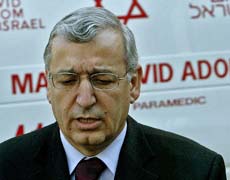
Shlomo Mor-Yosef, director of Jerusalem's Hadassah hospital, speaks
to reporters in Jerusalem, January 5, 2006. (Xinhua/Reuters)
Israeli Prime Minister Ariel Sharon has probably suffered irreversible brain
damage that would prohibit him returning to office, Sharon's doctors
acknowledged Thursday night.
The official statement released Thursday by Hadassah University Hospital, Ein
Karem in Jerusalem, where he is being treated, merely said that Sharon was in
serious but stable condition after suffering a cerebral hemorrhage due to the
rupture of an artery wall.
The statement, issued by Hadassah director Professor Shlomo Mor-Yosef, said
Sharon is under sedation, on a respirator and paralyzed.
He is likely to remain under sedation for up to 72 hours and it is impossible
to know what his condition really is until he emerges from sedation, the
statement said.
On Friday morning, doctors will perform a CT scan on the premier's brain to
check his condition. However, only on Sunday will doctors try to revive Sharon
from his induced coma to determine the effects of the hemorrhage for the first
time since it happened.
Mor-Yosef, the hospital manager, said on Thursday evening that predictions
for the future are almost impossible to make.
"We can't know what the results of the surgery will be, whether it will have
influenced his motor skills or his ability to think. Only after he comes out of
the induced coma will we be able to make an assessment."
Sharon will remain under heavy sedation and on a respirator for at least 48
hours at least, Mor-Yosef said, some 24 hours after he suffered an "extensive"
stroke and a massive brain hemorrhage.
"This is a lengthy process," Mor-Yosef said when asked when Sharon could be
expected to regain consciousness. "It won't be in the coming hours. It will be
at least 48 hours after the prime minister's emergence from surgery."
He said the treatment would decrease pressure in the prime minister's skull.
After the sedation period, doctors hope to gradually waken the prime
minister. Mor-Yosef said doctors had not received a "no resuscitation order,"
which would bar them from trying to revive a patient whose heart or breathing
has stopped.
"We are fighting for the life of the prime minister, with no compromise,"
Mor-Yosef said.
Mor-Yosef said that Sharon's pupils were responding to light, "which means
the brain is functioning."
Neurosurgeons had fought to stabilize Sharon's condition and stop new
bleeding detected in his brain Thursday morning, more than eight hours after the
prime minister was rushed into emergency surgery.
"The situation is still serious, but it's stable," Mor-Yosef said earlier
Thursday, as Sharon lay in intensive care.
Sharon emerged from hours of surgery Thursday morning with vital signs
showing "functional and stable" levels, and with a CT scan showing that the
bleeding in his brain had been halted. But the prime minister's condition
remained grave, Mor-Yosef said.
Israel Radio, noting that Sharon was in intensive care, said "The assessment
is that he is in a life-threatening state."
Sharon was rushed to the hospital after he felt pain in his chest Wednesday
night. Medical test showed that the prime minister suffered a extensive stroke
and a massive brain hemorrhage. Sharon suffered a minor stroke on Dec. 18.
Sharon not in vegetative state, brain, heart functioning
Israeli Prime Minister Ariel Sharon, who was in critical condition following
a lengthy surgery on Thursday, was not in a vegetative state as his brain and
heart were functioning, Israel's Channel 2 TV reported.
The channel cited an official at Jerusalem's Hadassah hospital where Sharon
remained in the intensive care unit as saying that Sharon was not in a
vegetative state and that he was able to respond to stimulation.
No further details were revealed by the report.
The 77-year-old Sharon was under sedation after a seven-hour-long surgery to
halt a cerebral blooding earlier in the day.
The veteran Israeli politician's grave illness has cast uncertainty over the
coming Israeli general elections slated for March 28 and the Mideast peace
process.



